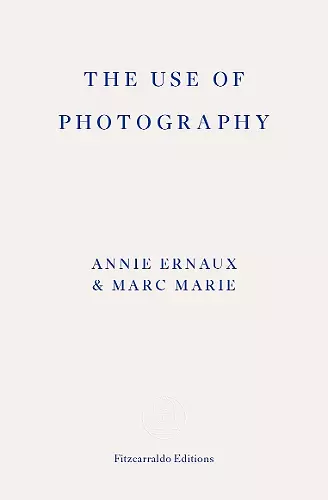The Use of Photography
Annie Ernaux author Alison L Strayer translator
Format:Paperback
Publisher:Fitzcarraldo Editions
Published:10th Oct '24
Should be back in stock very soon

The Use of Photography recounts a passionate love affair between Annie Ernaux and the journalist and author Marc Marie, after the two met in January 2003. Ernaux had been receiving intensive chemo for breast cancer during the prior three months, and had lost all her hair from the treatments. At the end of January she had surgery, followed by radiation therapy. The affair took place in different locations and Ernaux describes how, shortly after it began, she found herself entranced each morning by the sight of clothes strewn about, chairs out of place and the remains of their last meal of the evening still on the table – and how painful it felt to put things back in order afterwards. She went and got her camera, and began to take photographs of the scenes of disarray. When she told Marc Marie what she had done, he said he had felt the same desire. Translated by Alison L. Strayer into English for the first time, The Use of Photography is an extraordinary meditation on eroticism, photography and writing, a major work by the 2022 Nobel Prize in Literature laureate.
‘The Use of Photography … approaches Ernaux’s experience of breast cancer in the early 2000s with a similar fearlessness, emphasizing sensuality in the face of death. It is a radical gesture to treat the sick body, a body threatened by its own demise, as one that is also capable of performing that most generative of acts: sexual intercourse. In doing so, Ernaux takes control of, and breathes life into, the narrative of illness and death.’
— Rhian Sasseen, The Atlantic
‘With her signature resolute honesty, [Ernaux] dissects the power of passion and her own jealousy…. She awards herself the right to describe things just how they are without caring one jot how it reflects on her. This gives power to all her works.’
— Magdalena Miecznicka, Financial Times
‘In alternating chapters, Ernaux and Marie analyze photographs from that period, discussing the specter of death that hung over their trysts (at one point, Ernaux bought herself a funeral plot), the sweet devotion Marie felt for his ailing “mermaid woman,” and eventually, the end of their relationship. Each author’s candor – about their sexuality as well as the importance of such an intense connection at that crossroads in their lives – is remarkable, and is enhanced rather than obscured by the framework of photographic analysis. The results are generous, steamy, and unexpectedly moving.’
— Publishers Weekly
‘Reading her is like getting to know a friend, the way they tell you about themselves over long conversations that sometimes take years, revealing things slowly, looping back to some parts of their life over and over, hardly mentioning others.’
— Joanna Biggs, London Review of Books
‘Annie Ernaux is one of my favourite contemporary writers, original and true. Always after reading one of her books, I walk around in her world for months.’
— Sheila Heti, author of Pure Colour
‘Ernaux has inherited de Beauvoir’s role of chronicler to a generation.’
— Margaret Drabble, New Statesman
‘Across the ample particularities of over forty years and twenty-one books, almost all short, subject-driven memoirs, Ernaux has fundamentally destabilized and reinvented the genre in French literature.’
— Audrey Wollen, The Nation
‘I find her work extraordinary.’
— Eimear McBride, author of A Girl is a Half-Formed Thing
ISBN: 9781804271148
Dimensions: unknown
Weight: unknown
136 pages